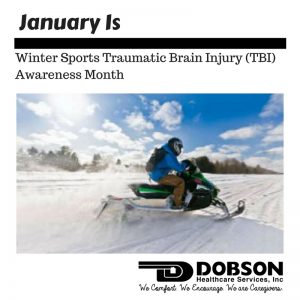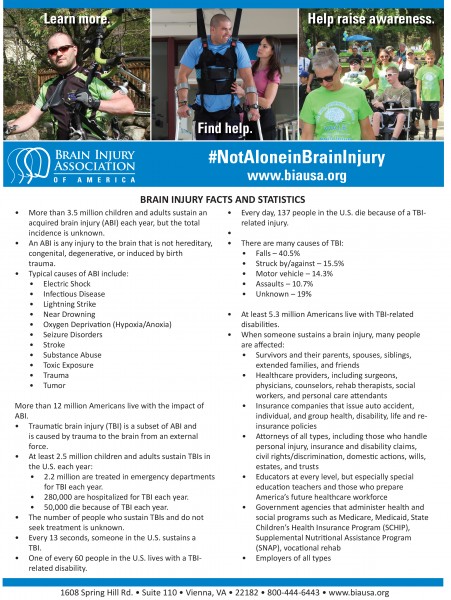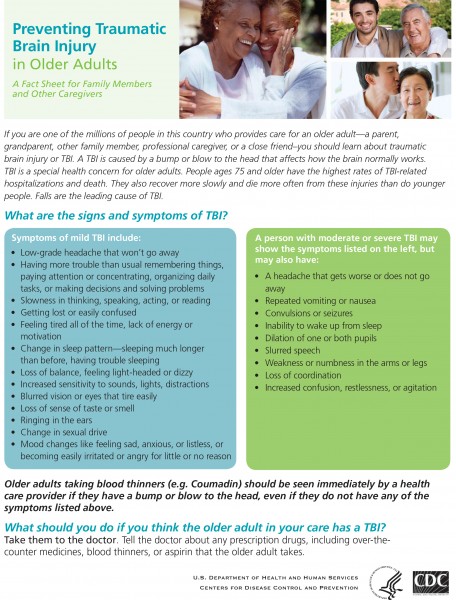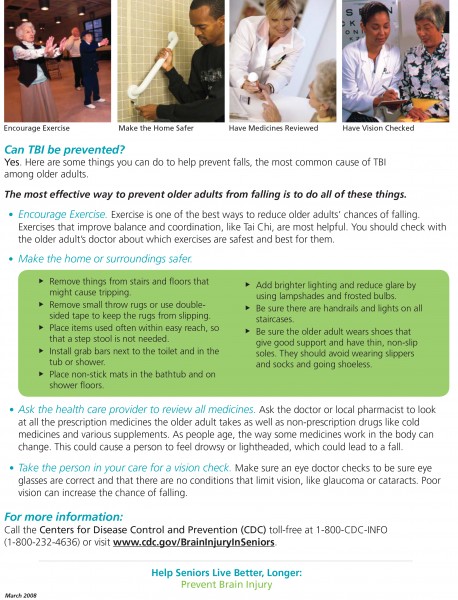- Remove the athlete from play.
- Ensure the athlete is evaluated by a health care professional experienced in evaluating concussions.
- Inform the athlete’s parents or guardians about the possible concussion.
- Keep the athlete out of play the day of the injury and until a health care professional experienced in evaluating concussion says they are symptom-free and okay to return to play.
The Brain Injury Association of America (BIAA) has put together the following Fact Sheet with statistics and other information to raise awareness and educate the public about brain injuries.
Brain Injury Association of America (BIAA), T. (2015). Brain Injury Facts & Statistics. Retrieved February 29, 2016.
People who have had a moderate or severe head injury may spend weeks or months in hospital before they are ready to go on to rehabilitation or to return home. Whether you go straight home from hospital, or into a neuro-rehabilitation center, depends on your needs. Before you leave hospital, you will have an assessment and be given a care plan. This will outline the next steps to help your recovery, such as physiotherapy or speech therapy.
Once you are ready to go home, you may still need help in order to become more independent and reach your goals. You should continue to get therapy from a community-based team. It is worth finding out what services are available near you to get as much help as you can. For example, you may qualify for state benefits or you may be able to get adjustments to your home, special equipment, help with chores around the house, special transport, or advice on getting back to work.
Everyday activities
You may be impatient to get back to your everyday routine and resume activities like driving or going to work. However, it is important to give yourself time to adjust and recover. The time it takes will be different from person to person and what is enough time for one person may not be enough for another. For some people, it may not be realistic to go back to life as it was before the head injury.
Can I drive?
Having a serious head injury will most likely affect your right to hold a current driving licence. You are legally obliged to notify the Driver and Vehicle Licensing Agency (DVLA) about your condition and must not drive until you have DVLA approval. You might be permitted to resume driving once a doctor has confirmed that you have made a full recovery.
If you are experiencing problems as a result of the injury you might not be allowed to drive for a given period of time (often one year). The DVLA might give your General Practitioner (GP) this information instead of giving it directly to you. If you have seizures, this period might be extended until the seizures are controlled. If you continue driving without DVLA approval, insurers will not be obliged to meet any costs and you might be uninsured. This would make you personally liable for any damage you cause to others.
If you have any disabilities you will probably need a medical examination to be certain you can control a vehicle safely. Also, modifications to your vehicle might be required and your vision will also be checked. You can re-apply for your licence before the date you are scheduled to return to driving so that it is ready by the time this date comes around. However, you will probably only be given a three year licence. Furthermore, many insurance companies increase the rates for people who have had a head injury, so you might need to consider changing your insurance provider to get a more affordable policy. Regulations are stricter for HGV (Heavy Goods Vehicle) or PSV (Public Service Vehicle) licences.
Can I fly?
Yes, depending on your recovery. There is nothing to stop you from flying once you are fit enough to do so. You might experience headaches during take-off and landing due to pressure changes. You should increase your fluid intake, but try to avoid alcohol and caffeine as these can dehydrate the brain and increase the risk of headaches. Keep in mind that air travel can be stressful for people in good health so it can be especially stressful if you are feeling unwell.
Can I play sports?
Everyone is affected differently by head injuries and you will need to take it easy during your recovery. This means that it may not be appropriate for you to embark on an exercise regime for months after your injury. You will go through a period of rehabilitation with physiotherapy and occupational therapy exercises that will help you regain basic physical skills.
Your physiotherapist, GP, or specialist will tell you what type of physical activity is suitable for you and when you can start increasing your levels of activity. You should avoid all contact sports like rugby, boxing or martial arts, and strenuous exercise like lifting weights, for at least six months. You can then discuss with your specialist the possibility of resuming these sports if you wish to.
Can I drink alcohol?
You should not drink any alcohol for the first three weeks after sustaining a head injury. After that period of time, small amounts of alcohol are safe (although you are likely to feel the effects more than you used to). There is also a risk of provoking a seizure if you drink too much. Some people find that they have more severe hangovers after a head injury. If you are taking any medication – especially anti-epileptic drugs – you should check with your doctor if it is safe to drink alcohol.
When can I go back to work?
After your head injury you may not be able to do all the things you previously could. You may be affected by psychological problems, like memory and concentration, and physical problems, such as mobility. It is important to take things slowly, like not returning to work before you are ready, and consider ways in which you could adapt your work or workplace to make things easier for you.
Before returning to work, you should check with your GP or specialist to make sure they agree you are ready. If appropriate, many people find it helpful to go back part-time or for a few hours each week before returning to full-time status. Neurosupport, the charity providing non-medical information and support to people with neurological conditions, runs an Employment and Community Service to help and advise people affected by brain injuries with any issues to do with employment or in finding a meaningful alternative to work. When someone has had a serious head injury, it is hard to know what will happen in the future, how the person will recover and what kind of care they will need.
Want more information?
Visit the Brain Injury Association of America or the Brain Injury Association of Michigan to learn more about living with a brain injury.
For information on home care options for you or a loved one, visit Our Specialties page or give us a call at 866-8668984!
Brain & Spine Foundation (2013, October) Going home and rehabilitation after a moderate to severe head injury. Retrieved February, 26, 2016.
A Traumatic Brain Injury (TBI) refers to the amount of damage done to the brain tissue resulting from a closed or open head injury. The Glasgow Coma Scale (GCS) is most often used by doctors to determine the category of the TBI in which the “severity” ranges from mild (briefly disoriented/loss of consciousness) to moderate to severe (unconscious for an extended period of time).
No two brain injuries are the same. However, because this injury affects the brain, major lifestyle (and possibly personality) changes might occur. For example, you or someone you know who suffered a TBI may now require either short-term or long-term care. In the following article, we will list the initial aspects of a Traumatic Brain Injury.
What causes a TBI?
A blow to the head can occur from a variety of accidents. Some examples include:
- A motor vehicle crash
- Sports injuries
- A fall
- Assaults
- A bicycle crash
- Military service-related injuries
- Child abuse/domestic violence incidents
- The skull being struck by a blunt or heavy object
Common Symptoms After a Mild TBI
- Headaches
- Bruises—When the head is hit, the brain can be shaken around inside the skull. If the shaking was hard enough, the brain can get bruised as it hits the skull. Just like bruises you might get on your arms or legs, these go away in time.
- Swelling— If there are lots of bruises, there also might be swelling. Swelling takes longer than bruising to return to normal.
- Dizziness
- Nausea and sensitivity to light and sound
- Snapped nerve fibers—The brain is made of millions of cells called neurons that are connected to each other by long, thin fibers called axons. If the TBI is serious enough, some of these axons can snap or break during a concussion. When this happens, different cells in your brain cannot communicate properly with each other. With time, however, these will heal and many patients have a complete recovery.
- Broken blood vessels—Like any other part of the body, the brain has blood vessels in it. If a TBI is very serious, some of these blood vessels can tear and bleed soon after the injury. Usually, the bleeding stops on its own and the blood vessels heal like any other cut does.
It’s important to note that these symptoms may not occur right away and could appear days or even weeks after the accident.
Determining the level of the TBI
- Severity of initial injury
- Rate/completeness of physiological recovery
- Functions affected such as cognitive, motor, sensory, verbal, and emotion
- Meaning of dysfunction in the individual’s life
- Resources available to aid recovery of function
Where can you go for support?
- Brain Injury Association of Michigan (BIAMI) Helpline: 800-772-4323 or www.biami.org.
- Michigan Department of Community Health TBI website, www.michigan.gov/tbi, has many free educational materials including:
- Michigan Resource Guide for Persons with Traumatic Brain Injury and Their Families, a 96-page directory of resources that provides information about TBI, the signs of TBI and a wide variety of services that are available.
- Dobson Healthcare: 866-866-8984 or www.dobsonhealthcare.com.
Evans, R.W., Evans, R.I., & Sharp, M.J. (1994). The physician survey on the post-concussion and whiplash syndromes. Headache, 34, 268-74.
Kashluba, S., Paniak, C., Blake, T., et al. (2004). A longitudinal, controlled study of patient complaints following treated mild traumatic brain injury.
Archives of Clinical Neuropsychology. 19, 805-816.
McCrea, M., Guskiewicz, K.M., Marshall, S.W., et al. (2003). Acute Effects and Recovery Time Following Concussion in Collegiate Football
Players – The NCAA Concussion Study. Journal of the American Medical Association, 290, 2556-2563.
Mittenberg, W., Zielinski, R.E., & Fichera, S. (1993). Recovery from mild head injury: A treatment manual for Patients. Psychotherapy in Private
Practice, 12, 37-52.
Mount Sinai Medical Center. (n.d.). What Happens Immediately After the Injury? Retrieved February 10, 2016 from brainline.org.
Rohling, M.L., Meyers, J.E., & Millis, S.R. (2003). Neuropsychological Impairment Following Traumatic Brain Injury: A Dose-Response Analysis.
The Clinical Neurolopsycholoigist 17, 289-302.
Traumatic Brain Injury.com, LLC. (n.d.). Mild TBI Symptoms. Retrieved February 10, 2016, from traumaticbraininjury.com.
Traumatic Brain Injury.com, LLC. (n.d.). Severe TBI Symptoms. Retrieved February 10, 2016, from traumaticbraininjury.com.
Photo: Chlossser, M. (2015). Slip and Fall Accidents the Leading Cause of Traumatic Brain Injury. Retrieved February 10, 2016.
The New York Times had a great article about advances in treatment of individuals with Traumatic Brain Injuries today. The number of American Soliders with TBI’s is only going to increase and new breakthroughs in care are a wonderful thing to see! At Dobson we are constantly searching for the most cutting edge care we can find for our clients who have suffered a traumatic brain injury, this includes keeping up on the trends of care that are coming to the mainstream such as “neuroplasticity” that the New York Times article discusses.
Some Great News for veterans who have suffered a traumatic brain inury since Oct. 7th, 2001. If you know someone who has suffered a TBI while in the service from that date forth, please pass on this information!
Complementary medical treatments for TBI’s?
A recent study out of the University of Colorado, Boulder indicates that an ancient form of “complementary” medicine MAY be effective in helping treat people with a mild traumatic brain injury, “TBI”. The treatment known as acupressure, is where one’s fingertips are used to stimulate particular points on a person’s body. The results indicate a link between the acupressure treatments and enhanced cognitive function in the study subjects with mild TBI. The study subjects showed scoring on tests of working memory significantly better when compared to the TBI subjects in the placebo group. This hypothesis suggest that acupressure could be an effective adjunctive therapy for TBI sufferers.
The acupressure treatment type used in this study is called Jin Shin. The practitioners used 26 points on the human body from the head to the feet. These points are found along “meridians” in the body that are associated with specific energy pathways. It is believed that each point is tied to the health of specific organs in the body as well as the entire body and brain. The meridians are described as “freeways” and the pressure points as towns along the way. For example, when there is a traffic jam in Detroit that causes problems as far away as Flint, clearing the traffic jam or “energy blocks” helps to improve the flow, therefore overall health.
The team then used a standard series of neuro-psychological tests to assess the results. The subjects receiving active acupressure treatments, showed increased memory function. Those receiving treatments also responded to stimuli more rapidly than those receiving placebo treatments.
The hope is that the Jin Shin treatment may be useful to military veterans returning home with TBI’s. The treatment can be taught to family and friends of those with TBI and can even be used as a self treatment, which could allow for more independence.
A 2010 study on acupressure concluded that Jin Shin triggered a larger and faster relaxation response during active treatments and a decreased stress response following active treatments compared to placebo treatments. A new study is being embarked upon with Jin Shin with regard to athletes to see if the enhanced relaxation response and decreased stress can reduce the likelihood of athletic injury.
Source: Centre for Neuro Skills, Spring 2011
April 2011 TBI Tidbit provided by Dar Warner, LPN, CBIS. Dar can be contacted at darwarner@dobsonhealthcare.com
Dobson Healthcare will be a sponsor and exhibitor at this years Brain Injury Symposium at Origami Brain Injury Rehabilitation. This years event will be held Thursday June 2, 2011 from 7:30a to 4:30p. For more information on the event please call Jennifer Pascoe at 517-455-0264 or visit the event homepage.
This years Keynote Speaker:
Kara Swanson, TBI Survivor, 15 years post injury. Author of “I’ll Carry The Fork! Recovering A Life After Brain Injury”. Author of several magazine articles in TBI-related publications. Kara is a sought after keynote speaker and has traveled nationally and internationally to share her personal story.
Where:
Kellogg Hotel & Conference Center
55 South Harrison Rd.
Michigan State University
East Lansing, MI 48824-1022




